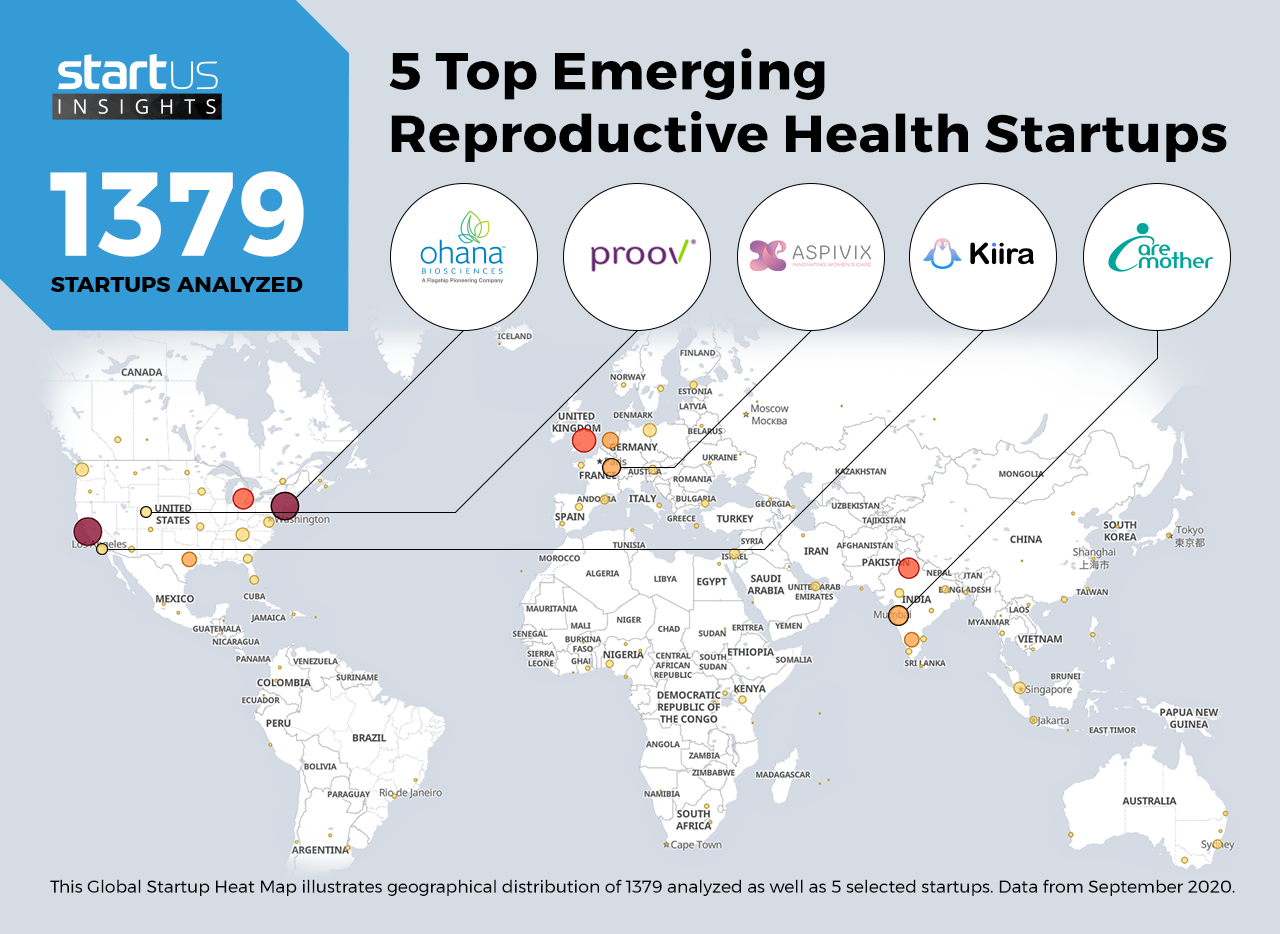Accelerate Productivity in 2025
Reignite Growth Despite the Global Slowdown
Our Innovation Analysts recently looked into emerging technologies and up-and-coming startups working on solutions for the healthcare sector. As there is a large number of startups working on a wide variety of solutions, we want to share our insights with you. This time, we are taking a look at 5 promising reproductive health startups.
Heat Map: 5 Top Reproductive Health Startups
Using our StartUs Insights Discovery Platform, covering 1.379.000+ startups & scaleups globally, we looked at innovation in the field of healthcare. For this research, we identified 1.379 relevant solutions and picked 5 to showcase below. These companies were chosen based on a data-driven startup scouting approach, taking into account factors such as location, founding year, and relevance of technology, among others. Depending on your specific criteria, the top picks might look entirely different.
The Global Startup Heat Map below highlights 5 startups & scaleups developing innovative reproductive health solutions. Moreover, the Heat Map reveals regions that observe a high startup activity and illustrates the geographic distribution of all 1.379 companies we analyzed for this specific topic.
Aspivix – Surgical Devices
Traditionally, women use different contraceptive methods such as injections, pills, and vaginal rings, but implants and intrauterine devices (IUDs) are the most effective. Gynecologists use the cervical tenaculum to stabilize the uterus before implanting IUDs, a procedure that causes pain and bleeding. The fear of this pain often discourages women from using IUDs. Startups and scaleups develop surgical devices that provide a gentler and safer experience compared to the cervical tenaculum.
Swiss startup Aspivix provides medical devices for gynecology applications. ASPIVIX is a vacuum suction-based device that engages the cervix and facilitates the entry into the uterus without any trauma to the tissue. Moreover, the single-use device reduces the risk of cross-contamination, enhancing the safety of the procedure.
Ohana Biosciences – Sperm Fertility
Many men and women struggle with reproductive fertility, particularly in their late thirties and forties, often due to lifestyle choices. Advancements in healthcare, especially in infertility treatment, help millions of couples across the world. Artificial Intelligence (AI) algorithms support doctors in using sperm samples to identify the various functional complications that manifest in them.
The US-based BioTech startup Ohana Biosciences develops novel tools to identify disease alleles, spontaneous mutations, and DNA damage that impact sperm fertility. The startup applies machine learning and other integrative analyses to identify the functional impact of sperm diversity in men. Ohana Biosciences utilizes single-cell sequencing, high-throughput imaging, and cell surface profiling to distinguish the differences in sperm at the molecular level.
MFB Fertility – Ovulation Kits
Women are increasingly giving birth at later stages in their lives and need solutions that help them do so. This entails keeping track of ovulation cycles and luteinizing hormone (LH) levels, as well as progesterone levels in case of fertilization. Medical device advancements allow women to track this vital information from the comfort of their homes, enabling better planning for pregnancies.
The US-based startup MFB Fertility manufactures Proov, an at-home female fertility testing kit. The startup’s product is easy to use and delivers accurate results within 5 minutes of use. The solution also tracks the pregnanediol (PdG) levels in the blood to confirm ovulation cycles, allowing women to improve the chances of conceiving.
Kiira Health – Virtual Clinic
As technological advances enable organizations to offer their services online, clinics and hospitals are following suit. For women’s health, in particular, access to reproductive health information allows women to prepare and plan for the various intricacies involved with pregnancies. For example, startups offer telehealth solutions that guide women through the duration of their pregnancies.
The US-based startup Kiira Health runs a virtual health clinic for women, available across employers, colleges, and health plans. With the help of an artificial intelligence-driven care coordinator, the startup provides medical assistance through chats and video conferencing with doctors. Their services range from testing for sexually transmitted diseases and fertility counseling to delivery and postpartum care.
Care Mother – Fetal Heart Monitoring
Digital health is transforming the way pregnant women get access to medical care for themselves and their unborn child. Technologies such as wearables and other (Internet-of-Things) IoT-enabled devices help obstetricians and gynecologists extend their guidance and monitor the vitals of the fetus remotely. Medical device startups develop easy-to-use devices to help expecting mothers reduce the anxiousness from the comfort of their homes.
Indian startup Care Mother develops Fetosense, a product that monitors the hearts of fetuses. The smartphone-based interactive machine includes a portable kit, with wireless probes, that relays test results back to doctors in real-time. Moreover, the device includes an in-built printer and offers unlimited storage of digital health records.
What About The Other 1.374 Solutions?
While we believe data is key to creating insights it can be easy to be overwhelmed by it. Our ambition is to create a comprehensive overview and provide actionable innovation intelligence and enable you to achieve your goals faster. The 5 reproductive health solutions showcased above are promising examples out of 1.379 we analyzed for this article. To identify the most relevant solutions based on your specific criteria, get in touch.








